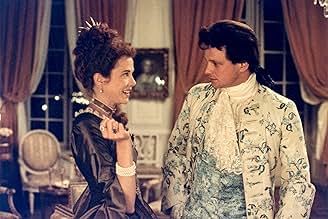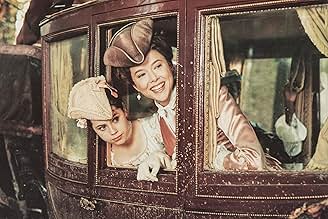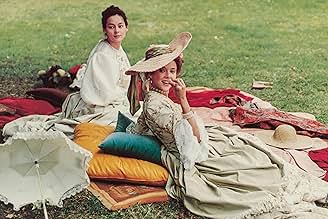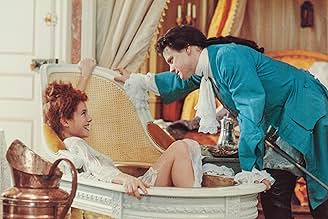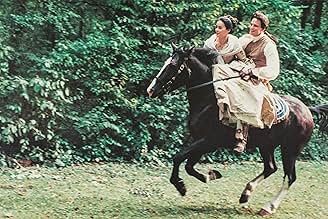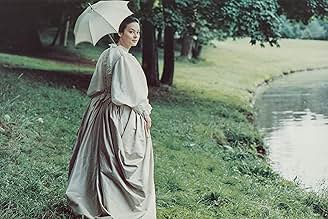France before 1789: When a widow hears that her lover is to marry her cousin's daughter, she asks the playboy Valmont to take the girl's virginity. But first she bets him, with her body as p... Read allFrance before 1789: When a widow hears that her lover is to marry her cousin's daughter, she asks the playboy Valmont to take the girl's virginity. But first she bets him, with her body as prize, to seduce a virtuous, young, married woman.France before 1789: When a widow hears that her lover is to marry her cousin's daughter, she asks the playboy Valmont to take the girl's virginity. But first she bets him, with her body as prize, to seduce a virtuous, young, married woman.
- Director
- Writers
- Stars
- Nominated for 1 Oscar
- 3 wins & 5 nominations total
Siân Phillips
- Madame de Volanges
- (as Sian Phillips)
Sébastien Floche
- Priest
- (as Sebastien Floche)
- Director
- Writers
- All cast & crew
- Production, box office & more at IMDbPro
Featured reviews
I notice a bit of a war going on between partisans of this and "Dangerous Liaisons" (the Glenn Close/John Malkovich/Stephen Frears vehicle). I'm not entirely sure why, but I find "Valmont" so much better. I think it's because: A) Milos Forman is unquestionably a better director than Frears, especially when he can call on the photographic talents of a cinematographer like Miroslav Ondricek; B) "Valmont" takes the time to develop some of the relationships between characters on screen, while the other simply injects the viewers into preexisting relationships; C) Colin Firth and Annette Benning are quite simply sexier than Glenn Close and John Malkovich; "Dangerous Liaisons" is too intellectual, while "Valmont" works at the hormonal level too. D) Fairuza Balk is far more believable as a virgin than Uma Thurman (can anyone say differently?!?). I certainly acknowledge "Dangerous Liaisons" as a well-made, well-acted film, but in the end I find it nearly unwatchable compared to "Valmont", which I can (and have) enjoyed over and over.
I liked this better than Dangerous Liaisons which came out at about the same time. Of course Dangerous Liaisons was very good, and John Malkovich, who played Vicomte de Valmont, is an actor of power, and Glenn Close, who played the Marquise de Merteuil, is highly accomplished, but I preferred the charm of Colin Firth in this film to the brutality of Malkovich, and I thought Annette Bening was just delightful. She played Merteuil with exquisite timing and an ironic witchery and warmth that I shall not soon forget. I preferred her playful, sly wit to Close's cool cynicism.
The story comes from a novel by Choderlos de Laclos set in 18th century France that was made into a stage play by Christopher Hampton. It is a cynical satire on human sexuality as well as a very subtle examination of sexual hypocrisy and desire, a kind of oh so sophisticated laugh at bourgeois morality that would have delighted Voltaire and Moliere and greatly amused Shakespeare. It is a tale of elaborate lechery and revenge that backfires because it seems that anybody, even the most jagged rake can fall in love, and thereby become the victim. The central assumption here is the same as that of the Cavalier poets, namely that marriage kills love. As Merteuil says, "You don't marry your lover."
Meg Tilly played Madame de Tourvel with subtlety and a riveting passion. One of the great sequences in the movie occurs after she has fallen madly in love with Valmont against her will. She stands outside his doorway in the rain for hours looking adoringly and forlornly up at his window. And then she is allowed to enter and receive a cool reception. Valmont says, "Do you want me to lie to you?" and she replies desperately, "Yes," and then it is her passion that overwhelms him, leading to a beautifully ironic twist. Shortly afterward he sees Merteuil, who has become more like a sister than an ex-lover, and says, "I feel awful." She replies, "Are you surprised? (Pause) You are an awful man." Hanging his head he continues, "Do you think a man can change?" "Yes. (Pause) For the worse."
This theme, that it is the beloved who has the power and that once you fall in love you lose all power, is repeated several times in the movie. Valmont pursues women, the harder to get the better, with a relentless and maniacal passion, but once he has them, he immediately loses interest. His making love absentmindedly to Cecile de Volanges (played with wide-eyed innocence and girlish charm by Fairuza Balk) was an incredible irony when we consider what she would cost Gercourt, played with his rather substantial nose in the air by Jeffrey Jones, whom you may recall as the pratfalling principal in Ferris Bueller's Day Off (1986).
There is some insidious philosophy here, some sardonic observations on human nature worth mentioning. One is that the man beloved of women gets most of the reproductive tries, and regardless of his rakishness, is still beloved. Another is that duplicity is the accepted, even required, standard of behavior in society, and that when it comes to sex, one must, perforce, always lie.
Milos Forman's direction was invisible and therefore a work of art. The incidental scenes and backdrops depicting the color, squalor and decadence of pre-revolutionary France added just the right amount of atmosphere. The costumes were stunning and much cleaner than they would have been in reality. The elegance and beauty of all the titled people merrily contrasted with the crude ugliness of the common people, rightly reflecting the effete snobbery of the aristocracy before the time of the guillotine.
(Note: Over 500 of my movie reviews are now available in my book "Cut to the Chaise Lounge or I Can't Believe I Swallowed the Remote!" Get it at Amazon!)
The story comes from a novel by Choderlos de Laclos set in 18th century France that was made into a stage play by Christopher Hampton. It is a cynical satire on human sexuality as well as a very subtle examination of sexual hypocrisy and desire, a kind of oh so sophisticated laugh at bourgeois morality that would have delighted Voltaire and Moliere and greatly amused Shakespeare. It is a tale of elaborate lechery and revenge that backfires because it seems that anybody, even the most jagged rake can fall in love, and thereby become the victim. The central assumption here is the same as that of the Cavalier poets, namely that marriage kills love. As Merteuil says, "You don't marry your lover."
Meg Tilly played Madame de Tourvel with subtlety and a riveting passion. One of the great sequences in the movie occurs after she has fallen madly in love with Valmont against her will. She stands outside his doorway in the rain for hours looking adoringly and forlornly up at his window. And then she is allowed to enter and receive a cool reception. Valmont says, "Do you want me to lie to you?" and she replies desperately, "Yes," and then it is her passion that overwhelms him, leading to a beautifully ironic twist. Shortly afterward he sees Merteuil, who has become more like a sister than an ex-lover, and says, "I feel awful." She replies, "Are you surprised? (Pause) You are an awful man." Hanging his head he continues, "Do you think a man can change?" "Yes. (Pause) For the worse."
This theme, that it is the beloved who has the power and that once you fall in love you lose all power, is repeated several times in the movie. Valmont pursues women, the harder to get the better, with a relentless and maniacal passion, but once he has them, he immediately loses interest. His making love absentmindedly to Cecile de Volanges (played with wide-eyed innocence and girlish charm by Fairuza Balk) was an incredible irony when we consider what she would cost Gercourt, played with his rather substantial nose in the air by Jeffrey Jones, whom you may recall as the pratfalling principal in Ferris Bueller's Day Off (1986).
There is some insidious philosophy here, some sardonic observations on human nature worth mentioning. One is that the man beloved of women gets most of the reproductive tries, and regardless of his rakishness, is still beloved. Another is that duplicity is the accepted, even required, standard of behavior in society, and that when it comes to sex, one must, perforce, always lie.
Milos Forman's direction was invisible and therefore a work of art. The incidental scenes and backdrops depicting the color, squalor and decadence of pre-revolutionary France added just the right amount of atmosphere. The costumes were stunning and much cleaner than they would have been in reality. The elegance and beauty of all the titled people merrily contrasted with the crude ugliness of the common people, rightly reflecting the effete snobbery of the aristocracy before the time of the guillotine.
(Note: Over 500 of my movie reviews are now available in my book "Cut to the Chaise Lounge or I Can't Believe I Swallowed the Remote!" Get it at Amazon!)
Cecile (Fairuza Balk) is a 15 year old who has been living in a convent for 6 years. She's happy that her mother Madame de Volanges (Siân Phillips) has arranged a marriage for her to Gercourt (Jeffrey Jones). Volanges trusts her cousin Marquise de Merteuil (Annette Bening) to guide Cecile but she doesn't know that Gercourt discarded Merteuil as his lover. For revenge, Merteuil intends to spoil Cecile's virginity and thereby her pending marriage to Gercourt. She asks her former lover, the Vicomte de Valmont (Colin Firth), to do the seducing but he refuses. He is more interested in bedding the married Madame de Tourvel (Meg Tilly). Merteuil makes an indecent bet with Valmont. Meanwhile Cecile falls for her music teacher Danceny (Henry Thomas).
Director Milo Forman brings a lascivious feeling to the material. The romance is drained out of this which is replaced with something darker. Fairuza Balk is shockingly young which only adds to its forbidden realism. Whereas the great Dangerous Liaisons feels luscious and beautiful, this version feels dirtier and uglier. Annette Bening is wonderful. This is an interesting second look at the same story.
Director Milo Forman brings a lascivious feeling to the material. The romance is drained out of this which is replaced with something darker. Fairuza Balk is shockingly young which only adds to its forbidden realism. Whereas the great Dangerous Liaisons feels luscious and beautiful, this version feels dirtier and uglier. Annette Bening is wonderful. This is an interesting second look at the same story.
'Valmont' was overshadowed by the popularity of 'Dangerous Liaisons' which released just about a year before. Both movies were based on the same novel. It has been too long since I last watched 'Dangerous Liaisons'. I remember the ending being slightly different and the acting a little more dramatic.
'Valmont' solidly makes its own stand. Milos Forman gives it a slightly larger than life look with the colourful lavish sets and exquisite costumes but he balances it wonderfully with the actors' subtle performances, a beautiful soundtrack and stunning cinematography.
Forman tells the story very well. Even though I had a vague idea of what it was about, I liked Forman's presentation and he still managed to surprise me a few times. 'Valmont' brings forth some strong themes, such as that of love, seduction, lust, sexuality, marriage, chastity, monogamy and envy. All themes are brilliantly incorporated into the story and characters. Additionally , the viewer delightfully benefits from some splendid lines, especially the dialogue delivered between Annette Bening and Colin Firth. Their sequences along with the one where a soaking wet Meg Tilly asks Valmont to love her and a dance number where Valmont dances with four women are some of the most memorable movie moments.
Needless to say, each and every one of the performances are first rate. I couldn't picture anyone else other than Colin Firth in Valmont's shoes. He plays the part naturally, fitting it like a comfortable glove. Annette Bening is delightful as the playfully wicked baroness. Meg Tilly is wonderful as Tourvel. Fairuza Balk is a great choice as she possesses the innocence, naivety and youthfulness of Cecile.
Valmont is definitely not your average costume drama. While it tells an engaging story on human relationships, it raises some interesting questions on the aforementioned themes, questions that hold strongly relevant for today's world too. It's a stunning cinematic piece.
'Valmont' solidly makes its own stand. Milos Forman gives it a slightly larger than life look with the colourful lavish sets and exquisite costumes but he balances it wonderfully with the actors' subtle performances, a beautiful soundtrack and stunning cinematography.
Forman tells the story very well. Even though I had a vague idea of what it was about, I liked Forman's presentation and he still managed to surprise me a few times. 'Valmont' brings forth some strong themes, such as that of love, seduction, lust, sexuality, marriage, chastity, monogamy and envy. All themes are brilliantly incorporated into the story and characters. Additionally , the viewer delightfully benefits from some splendid lines, especially the dialogue delivered between Annette Bening and Colin Firth. Their sequences along with the one where a soaking wet Meg Tilly asks Valmont to love her and a dance number where Valmont dances with four women are some of the most memorable movie moments.
Needless to say, each and every one of the performances are first rate. I couldn't picture anyone else other than Colin Firth in Valmont's shoes. He plays the part naturally, fitting it like a comfortable glove. Annette Bening is delightful as the playfully wicked baroness. Meg Tilly is wonderful as Tourvel. Fairuza Balk is a great choice as she possesses the innocence, naivety and youthfulness of Cecile.
Valmont is definitely not your average costume drama. While it tells an engaging story on human relationships, it raises some interesting questions on the aforementioned themes, questions that hold strongly relevant for today's world too. It's a stunning cinematic piece.
I must confess that the first time I saw that movie, few years after it's release, I couldn't help, but find it a pale version of Stefan Freirs "Dangerous Liaison". Recently I have seen both movies and I must say that my opinion is quite the opposite now. In "Valmont" everything is subtle and I think this is why most people didn't get it. You can destroy someone's life without having written "I'm Bad!" on your forehead. With her slow-velvet voice Annette Bening is a snake under a rock:she is terrifying. As for Colin Firth's Valmont he is charming, he flies like a butterfly, but he knows exactly what he is doing. We believe in his seduction not because we are told to but because we are seduced ourselves. People have been saying that Valmont was too light, too boyish. There is nothing boyish in the way he says at Mme de Tourvelle "Is that what you want?" You see at that point how his hight-pitched voice, that goes with his voice and smile, is only a mask, as powder was John Malkovitch's mask. Colin Firth said that Milos Forman was too subtle for his own good and I think this is why some people can still find "Dangerous Liaisons" more powerful. As for "Valmont" even if the end is a bit weak, I wouldn't hesitate to say that it is from far the best version of the two movies. For those who go by the book, as I once did, you might be puzzled by the differences with the original story but for its deep sensitivity, its wonderful cast and this art of subtlety, it's really worth every moment of it.
Storyline
Did you know
- TriviaMeg Tilly and Colin Firth fell in love while they were making the film. A year later they had a son together.
- GoofsWhen Tourvel is in the market, she places several food items in her basket one after the other. However, every time she does so, the basket appears empty even though she had just placed something in it a moment before.
- SoundtracksDivertimento for Winds in B Flat Major, K240
Wolfgang Amadeus Mozart
Performed by the orchestra of the The Academy of St. Martin-in-the-Fields
- How long is Valmont?Powered by Alexa
Details
- Release date
- Countries of origin
- Language
- Also known as
- Valmont. Relaciones peligrosas
- Filming locations
- Château de la Motte-Tilly, Nogent-sur-Seine, Aube, France(Madame de Rosemonde's estate)
- Production companies
- See more company credits at IMDbPro
Box office
- Budget
- $33,000,000 (estimated)
- Gross US & Canada
- $1,132,112
- Opening weekend US & Canada
- $96,008
- Nov 19, 1989
- Gross worldwide
- $1,132,112
- Runtime2 hours 17 minutes
- Color
- Aspect ratio
- 2.39 : 1
Contribute to this page
Suggest an edit or add missing content







